
Related
Topics
Puerto Rican protesters waited for U.S. federal authorities to expel them from the U.S. Navy’s prized training ground at Vieques — even as several U.S. lawmakers and a religious leader promised to come to show their support. [includes rush transcript]
Some 50 protesters on several campsites in the bomb-littered range and dozens more in front of its main gate say authorities will have to arrest them to clear the range, which has been idle since stray bombs killed a civilian guard in April 1999. A few have threatened to scatter into the bomb-strewn bush, endangering themselves and any pursuers.
Pentagon officials say a raid would be carried out in an FBI-led operation, and tensions have mounted since three U.S. warships arrived off Vieques on Monday, reportedly carrying 1,000 Marines to help secure the base perimeter once the area is cleared. Helicopters have been flying over the area, but authorities have given no hint of when an operation will begin.
At a briefing yesterday, a Pentagon spokesman refused to answer questions about a planned operation but vigorously defended the Navy’s position that the inhabited island alone offers the Atlantic Fleet “the opportunity to combine both the amphibious training, the naval gunfire training and the air-to-ground ordnance training.”
Discussion:
- Hosts Amy Goodman and Juan Gonzalez discuss the issue of Vieques.
Transcript
JUAN GONZALEZ:
The situation in Vieques is now at a final crisis point here, as the federal marshals, the FBI, about a thousand US Marines, Puerto Rican riot police, all are preparing to move against people who have been occupying the Navy’s bombing range on the island of Vieques for more than a year now.
AMY GOODMAN:
You wrote a piece in the New York Daily News yesterday, which was headlined, “This Will Make Little Havana Look Like a Picnic.”
JUAN GONZALEZ:
Yes. Well, for the second time in a week, actually, now — in two weeks now, we’re getting the federal government sending armed agents against a group of Hispanic Americans who have been defying the federal government, but this time, even though Elian Gonzalez and the Little Havana situation received far more publicity than has Vieques, Vieques has far greater repercussions and is of far greater importance to the general population of the country. To listen to the Pentagon, you would think that the entire national defense of the United States and the combat readiness of our troops is resting on the ability of the government to keep Vieques for the Navy’s use as its premier target practice range in the world.
AMY GOODMAN:
Before we move onto another issue that involves the militarization of federal agents, this on the border with Mexico, for listeners who, well, Vieques is just coming into their consciousness for, describe this island. You’ve been there.
JUAN GONZALEZ:
Well, Vieques is an island. It’s about fifty-two square miles. It’s about twice — maybe twice the size of Manhattan, and it is just off the eastern coast of Puerto Rico, and it has been used now by the US Navy, ever since the early 1940s, as both a munitions dump. Two-thirds of the island is controlled by the Navy, but 9,300 people live sandwiched in in the middle of the Island, in between two huge naval reservations. On the west coast of Vieques there is the munitions dump, which is main ammunition supply depot for the entire Atlantic fleet of the United States, and on the eastern end of the island there’s Camp Garcia, a base and training ground where the Navy has been conducting a ship-to-shore bombing practice, aerial bombing practice and also amphibious landings with live fire ammunition.
It’s been used not only by the United States Navy, but has been rented out for years now to allies, the NATO allies or the Latin American navies. So everybody gets to bomb Vieques and has been up until last year, when on April 19th an errant Navy flyer bombed too close to an observation post and killed a Puerto Rican security guard, and that has touched off this latest wave of protest. The Puerto Rican people have never been happy, and people of Vieques have sought to stop the Navy bombing, but not until this death occurred did the entire population of Puerto Rico rise up and demand the Navy get out.
On January 31st, President Clinton and Puerto Rican Governor Pedro Rossello reached an agreement by which the Navy would possibly pull out by 2003, definitely stop using live ammunition and live bombing immediately, but this would all depend on a referendum held only by the people of Vieques, the first referendum the United States Navy has ever held on the use of a military base, but that referendum, of course, would come after the Navy throws $40 million into Vieques and offers another $50 million, if the people of Vieques allow the Navy to stay. So one of the things that all the political leaders are pushing for now is that the referendum be held as soon as possible. The President’s agreement could have it held as soon as August of this year, August 1st, and that nothing happen on Vieques until then, but the Pentagon continues to insist that the combat readiness of United States forces in the Persian Gulf, in the Mediterranean and other places are being comprised by their inability to have live ammunition practice.
AMY GOODMAN:
You wrote in your piece, talking about what will happen with the protesters, what they’re going to do — we’ve talked to them over the last two weeks. Roberto Rabin, who is right at Camp Garcia, who says, you know, this is going to be a nonviolent civil disobedience. People will be arrested, they expect. But you also say that some people have threatened to resist by hiding in the surrounding hills and thick underbrush.
JUAN GONZALEZ:
Yes. And Vieques is — that area of the training facility has no roads. It’s littered, I mean, there are millions of unexploded cluster bombs, shells, missiles that have hit Vieques and never exploded. In fact, the Pentagon and the White House are more worried about people getting hurt, I think, because they’re the only ones who know all of the munitions that are actually on Vieques.
And, of course, if the people who have been camping out there in the various campsites — and there are about thirteen campsites — some of them head into those hills and in that underbrush, the federal marshals and the FBI are going to have to go in there after them. And the FBI has repeatedly said in the last few weeks that it’s worried about its ability to guarantee this mission, precisely because the people who have been protesting have been on Vieques now for a year.
So they definitely have some idea where — some of them have probably planned where they’re going to hide. Who knows if they’ve built some tunnels to be able to hide out for a while? And not only that, but more Puerto Ricans are ready to come into Vieques, in waves, to replace those who get arrested. In fact, the federal government has said that they will confiscate any boats of anyone who comes near the naval area after operations start.
This is going to touch off massive demonstrations throughout all of Puerto Rico, and, of course, most people don’t know, two Supreme Court justices are supposed to be in Puerto Rico on Friday, because there’s a major celebration of the reopening of the redesigned old federal courthouse in San Juan. So there will be two Supreme Court justices in Puerto Rico for a major ceremony on Friday, and I have a feeling they may become the target of a major demonstration by those people who are angry about what the government is about to do.
Unfortunately, the Clinton White House, at this stage, believes that they’ve done all they can do, but they’re under enormous pressure from the Pentagon. Already big rallies planned today here in New York City and other cities around the country, how will they respond? And also there’s always been a very strong militant independence movement in Puerto Rico, and it’s not quite clear how the militant wing of the independence movement will respond in case there are injuries or the situation in Vieques gets out of hand.
AMY GOODMAN:
Isn’t the head of the Independence Party in Puerto Rico at the camp?
JUAN GONZALEZ:
Yes, Ruben Berrios is at the camp, and actually he’s been in contact with the White House, because he’s an old Yale schoolmate of Bill Clinton’s, and so he actually stays in communication with the White House. There are some people who say Ruben Berrios, after a year on Vieques, would welcome an arrest just to be able to get into a different environment, because it’s a rough situation. You’re basically living on a beach with no shade, and he’s been out there for a year and actually been a little sick in recent weeks.
AMY GOODMAN:
It’s not surprising, I mean, isn’t this an island that has been bombed with — first of all, have they — they’ve hit it with depleted uranium, haven’t they?
JUAN GONZALEZ:
They’ve hit it with depleted uranium. They’ve hit it with napalm, and they’ve hit it with a lot of stuff that no one knows about. See, that’s why I say all my conversations with people in the White House and in the Pentagon indicate that they are very afraid of somebody getting injured by walking in the wrong place in Vieques, and, I mean, much more so than most of the protesters, so that indicates to me that they are aware of some kinds of warfare that they’ve conducted on Vieques that the rest of the American people don’t know about yet.
AMY GOODMAN:
And in addition to the protesters who are there now, I’m getting calls from all sorts of people who are headed down to Vieques in solidarity, different peace groups that are sending people. In fact, just this past weekend with the celebration of the end of the war in Vietnam, the twenty-fifth anniversary, the Vietnam Veterans Against the War have a whole contingent that have gone and are continuing to go.
JUAN GONZALEZ:
Not only the normal suspects that you would see in a situation like that, like, for instance, the National Council of Churches, but the Catholic Church. I was on a panel in Puerto Rico at the University of Puerto Rico in Cayey just two weeks ago, and my co-panelist, the bishop, the Catholic Archbishop of Caguas, Corrado del Rio, and he was extremely militant in his insistence that this agreement could not go through, that there could be no more bombing, live or dummy bombs, in Vieques. And Caguas is a city just to the south of San Juan, and Vieques is actually part of that diocese. So the Bishop of Caguas, the bishop of the diocese that covers Vieques, is very militant in support of the protesters. The Archbishop of San Juan, Roberto Gonzalez, also a very militant supporter of the protesters. In fact, I traveled with the Archbishop on a boat to visit the Vieques protesters back in August. So —
AMY GOODMAN:
You went with Jesse Jackson, covering —
JUAN GONZALEZ:
With Jesse Jackson, right, and a group of people who came from the United States. But the Archbishop was going there for the first time, and so the entire Catholic Church, the Baptist Church, the Lutherans, and there are several bishops ready to be arrested on Vieques right now, so that the entire religious community of Puerto Rico is continuing to insist that the Navy cannot continue to bomb — or cannot resume bombing, and, of course, all that the people are asking for — and interestingly enough, the New York Times editorial today backs the same thing. The New York Times editorial urges the Clinton administration not to arrest the protesters, but to move immediately to a referendum of the people of Vieques, and if they vote that they don’t want the Navy, that should be the end of it, so that you’ve seen some fissures already within the US establishment over this issue.
And I think that the important thing has to be that the American people should be heard on what they think is happening in Vieques, just as many Americans were heard on how they feel about the situation with Elian Gonzalez. Do the American people feel that it is appropriate for the United States Navy to continue to conduct live bombing exercises or any kind of bombing exercises on an island where American citizens insist they don’t want it, and especially after fifty, sixty years of this has already occurred?
AMY GOODMAN:
It’s also interesting that Puerto Rico has a disproportionate number of veterans from all the wars. What is the attitude of veterans?
JUAN GONZALEZ:
Well, that’s one of the things you hear from many of the most pro-military members of Congress and the Republican Party: the Puerto Ricans are being ungrateful, they have to bear their fair share of the nation’s national defense. The reality is that Puerto Rico, thirteen percent of the island is military bases, and Puerto Ricans have fought in every single war that the United States fought in this century, beginning with World War I, and suffered the highest casualty rate in the Korean War of any group of Americans, so that this viewpoint that Puerto Ricans have not or do not want to share the burden of the military defense of the United States is ludicrous.
The reality is that all that Puerto Ricans are saying is they don’t want the Navy in Vieques. They’re not saying they don’t want the Navy in all of Puerto Rico. But as Jesse Jackson told the group of admirals some months ago, when he was having the discussion with them, if you keep pressing the matter, you’re going to end up turning Puerto Ricans against the United States Navy completely.
AMY GOODMAN:
Well, we’re going to break for stations to identify themselves. Then we’re going to go the border in Tucson, Arizona and find out what ranchers are doing there, taking on the role of vigilantes, saying if the INS won’t catch immigrants coming over the border, they will.
We’re also going to be talking about microradio, as well as Time Warner and Disney, the face-off. And, Juan, one last thing before the break. Do we have an exclusive? Is it true Fidel Castro called you the other day, or was that another Juan Gonzalez who was at the Wye River Plantation with his son Elian?
JUAN GONZALEZ:
Amy, there are so many Juan Gonzalezes in the news right now. The only one that interests me is the one with the big baseball contracts. You know, the others — but there’s a lot of Juan Gonzalezes in the news, and, no, I did not get a call from Fidel.
AMY GOODMAN:
I guess it was Elian’s father.

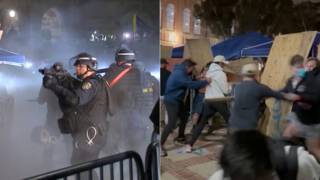
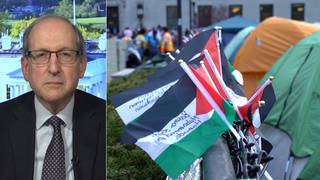
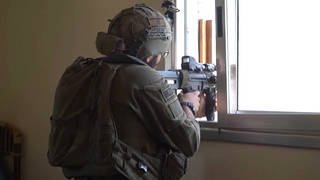
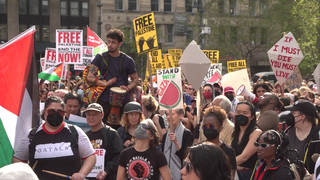





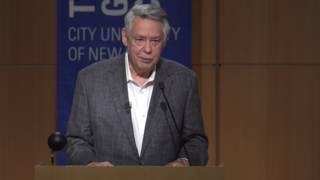
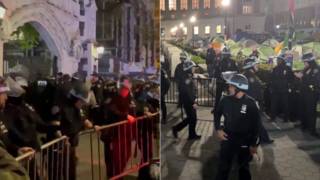
Media Options